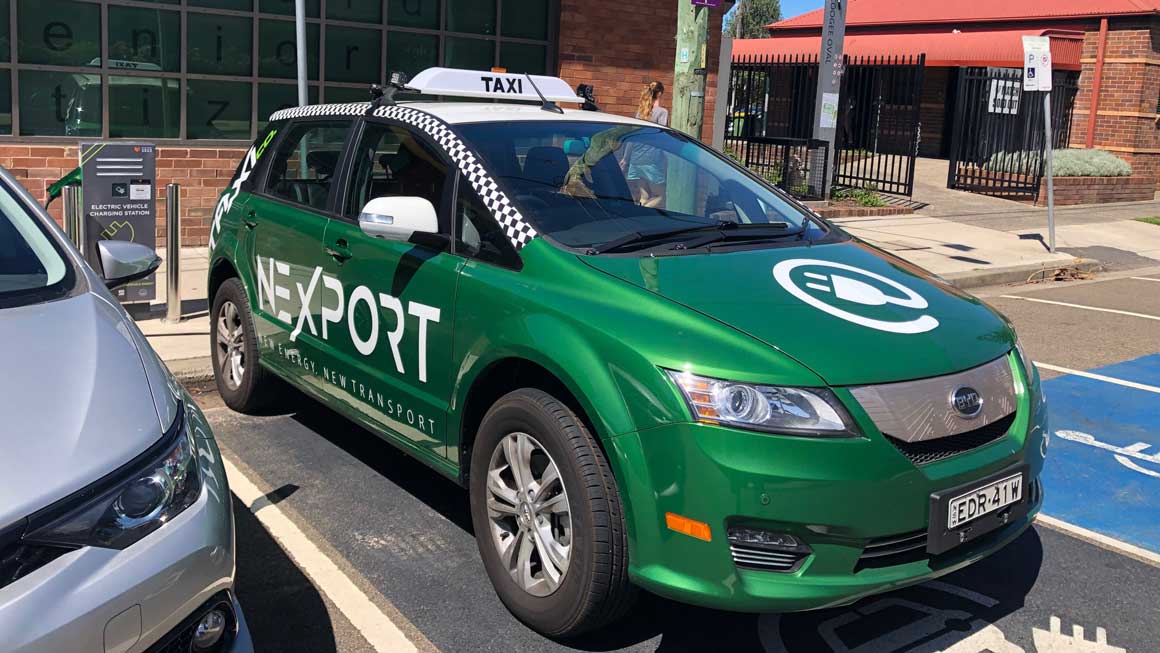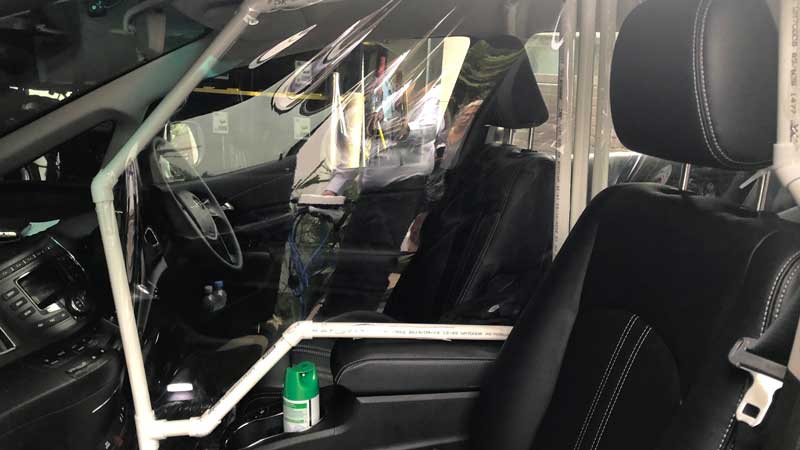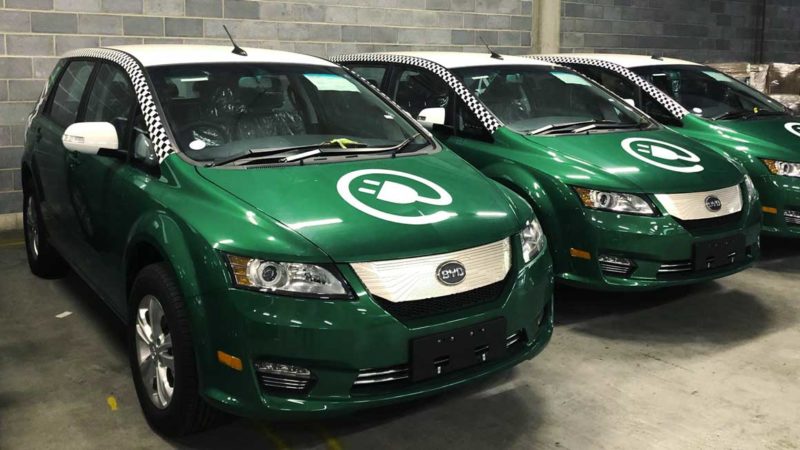A fleet of 120 electric taxis offering a “zero contact” transport alternative will launch in Sydney in coming weeks, the first in a planned 2,000 fleet as part of a “Clean Air Taxi” initiative by new e-taxi platform ETaxiCo.
As NSW begins to lift stay-at-home measures put in place to restrict the spread of the highly contagious novel Coronavirus, ETaxiCo plans to launch the fleet under a “Zero Contact, Zero Emissions” campaign.
Cities around the world report a vast improvement in air quality due to the drop in transport-related pollution, and the likes of Milan are considering measures to keep traffic down, and the e-taxi fleet is being touted as a small step for Sydney in the same direction.
The program has the support of Northern Beaches mayor Michael Regan as well as federal member for Warringah Zali Steggall, who ousted former PM and climate science denier Tony Abbott from the seat in 2019 on a platform of climate change initiatives
Luke Todd, managing director of ETaxiCo’s parent company Nexport, says he also hopes the program will encourage a return to using taxis, which had already been declining before Covid-19 due to ride-sharing companies such as Uber.
“We believe it will inspire the taxi market to move organically towards to EV take up instead of ICE or hybrid,” Todd tells The Driven.
“While we applaud the efforts to date of many operators moving to hybrid, we are looking at taking it to the next level of complete zero emissions vehicles which will become mainstream in coming years.”
The fleet will be operated from three sites in the Northern Beaches council area as part of a six month trial, but Todd says that ETaxiCo is keen to partner with more councils to reach their goal of 2,000 electric taxis on the road by the end of 2021.
Zero emissions
The program presents as a perfect fit for many local and state council goals to reduce carbon emissions, such as the City of Sydney’s Sustainable Sydney 2030 and the NSW Net Zero plan that seeks to encourage fleet transitions to electric vehicles.
“Northern Beaches council has been really warm to our initiative,” Todd says. “They provide us with dedicated priority positions at the front of existing ranks that are marked as EV only. In the Northern Beaches area we have three prime spots and an electric taxi is permitted to move to front of queue, and that promotes the Clean Air Taxi initiative.”
When the program launches – which is at this current time planned for next month depending on Covid-19 factors – it will be using 15 specially fitted e6 electric compact SUVs made by Warren-Buffet backed EV and battery maker BYD that have been imported by Nexport, with plans to expand the fleet to 120 by August.
The vehicles, which are right-hand drive and have been approved for driving on Australian roads, are the same that have been deployed in a 45,000-strong taxi fleet in China’s industry centre of Shenzhen.

Nexport is also in talks with other electric car makers to secure vehicles to satisfy future demand for the fleet, a move which should further give confidence to importers to supply the fledgling Australian electric car market.
Additionally, Todd says the ETaxiCo will foster more demand for a rollout of electric car charging locations.
“As part of our initiative we are also working with charging infrastructure companies to roll out increased charging support for our vehicles which could also be used for public charging. The rapid uptake of taxi deployment we see as being a contributor to national networks,” he says.
Making the switch to the zero emissions fleet would also enable corporates access to extensive cost and emissions reporting, says Todd.
“A company may be using Cabcharge or another means of transport as a means of travel – if they switch to the ETaxiCo platform, we will be able to provide that entity with a regular report on that transport usage and therefore we capture the reduced emissions of that entity.
“We see this is a game-changer for corporate travel as far as car usage or taxi usage is concerned, as it not only provides cleaner air and a better environment, it also enable companies to accurately capture and report on transport usage through the ETaxiCo platform,” Todd says.
Zero contact travel
Nexport is looking to partner with taxi operators, rather than compete against them, and also wants to reach out to corporate customers wanting to reduce carbon emissions to meet sustainability goals.
Nexport has adapted an existing “capsule” system to create separate areas for the driver, front passenger and both left and right back seat passengers, that reduces the chance of transmitting the Covid-19 disease.
“We’re taking this head on because the taxi industry has taken a massive hit over the past couple of months with a 90% drop in patronage with people being confined at home,” Todd says.
“Through our initiative, because we’ll be deploying brand new cars, we have a unique angle to come into the market at this time with a product that provides safe and convenient transport through the installation of zero contact taxi screens.”
“They are essentially creating dividers for each seat.”

Todd says strict hygiene protocols will be put in place, including being disinfected top to toe daily, with periodic cleans throughout the day and hand sanitiser provided in each of three passengers compartments, alongside signage to encourage use.
With a rollout planned within six to eight weeks, Todd says he expects the zero contact, zero emissions taxis to become a preferred transport option for the sick and elderly, and notes that they will be able to be ordered across Sydney although the dedicated ranks are currently in the Northern Beaches.
“We think they will be extremely popular at hospitals, as safe passage for health workers and patients and the elderly who need to move. We see as being really beneficial as we manage this time of uncertainty.”
RenewEconomy and its sister sites One Step Off The Grid and The Driven will continue to publish throughout the Covid-19 crisis, posting good news about technology and project development, and holding government, regulators and business to account. But as the conference market evaporates, and some advertisers pull in their budgets, readers can help by making a voluntary donation here to help ensure we can continue to offer the service free of charge and to as wide an audience as possible. Thankyou for your support.

Bridie Schmidt is associate editor for The Driven, sister site of Renew Economy. She has been writing about electric vehicles since 2018, and has a keen interest in the role that zero-emissions transport has to play in sustainability. She has participated in podcasts such as Download This Show with Marc Fennell and Shirtloads of Science with Karl Kruszelnicki and is co-organiser of the Northern Rivers Electric Vehicle Forum. Bridie also owns a Tesla Model Y and has it available for hire on evee.com.au.


